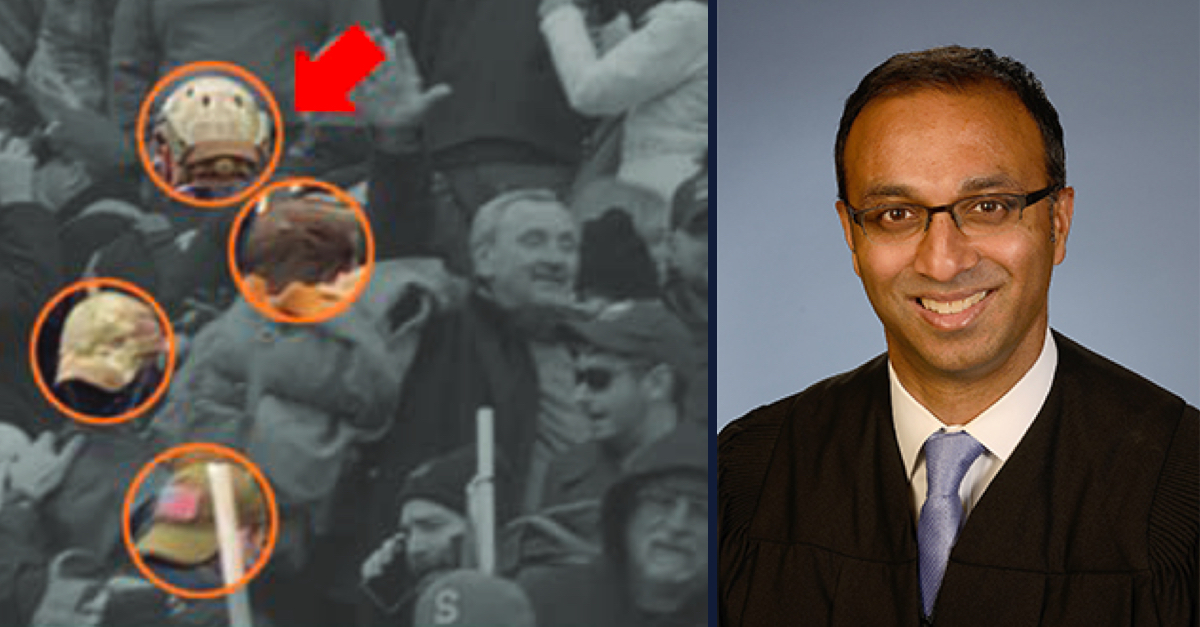
Oath Keepers approach the Capitol in “stack” formation on Jan. 6, with the red arrow indicating Florida Oath Keepers chapter leader Kelly Meggs (via FBI court filing); U.S. District Judge Amit Mehta (via U.S. District Court for the District of Columbia)
The federal judge overseeing the Jan. 6 seditious conspiracy case against members of the extremist Oath Keepers group has agreed to the defendants’ joint request to delay the trial.
U.S. District Judge Amit Mehta is overseeing two Oath Keepers cases stemming from members’ alleged actions before and during the attack on the U.S. Capitol. One case charges Oath Keepers leader Stewart Rhodes and eight co-defendants with seditious conspiracy, obstruction of Congress, among other charges. A second case charges Donovan Crowl and five other of members of the Oath Keepers with conspiracy, fraud, obstruction, and other felonies and misdemeanors.
He has previously resisted efforts to continue the Rhodes trial, which will be split into two trials due to the number of defendants. The first Rhodes trial was set for July, with the second trial to start in September.
On Friday, Mehta, a Barack Obama appointee, conceded that a delay in trial appears necessary.
“At some point it’s perhaps not worth insisting that defense counsel and their clients go to trial on the court’s own schedule,” said Mehta, who has repeatedly noted that he has a very full trial calendar. “The truth of the matter is this is a complicated case. This is a unique case, and there are a lot moving parts. That said, I also don’t want to be in a position where any of these clients is going to claim ineffective assistance of counsel bc their attorneys haven’t had sufficient time to prepare.”
However, Mehta was clear that he had no intention to delay the trial again, and he expected the defense lawyers to be similarly prepared.
“Do I have a commitment from each of you that if I move the July trial date that it will not get a request for continuance absent an extraordinary circumstance that is not anticipated at this point?” Mehta asked.
That question appeared to be in direct response to comments from a few of the defense lawyers that they were concerned that media coverage of hearings before the House Committee investigating Jan. 6, which are anticipated to start in June, may prejudice their clients.
Nonetheless, most lawyers told Mehta that they would not request a continuance except under extraordinary circumstances. Matthew Peed, who recently took over representation of defendant Edward Vallejo, didn’t go so far as to guarantee he wouldn’t make such a request, although he did indicate that he may try to get his client severed from the case overall.
During the hearing, Mehta also reiterated that he would not be able to try all nine defendants in the Rhodes case in a single trial, which is why the September and November dates are necessary.
“If I wanted to put all nine of you in a trial at the same time and we had the capacity to do it, I would do it, but we do not have that capacity in this courthouse,” Mehta said, adding: “In fact, I am told that a nine-person trial has not been held in this courthouse, period. Full stop. I think the largest is six or seven.”
During the status conference, Mehta again addressed the issue of representation for Kelly Meggs, whose attorney, Jonathon Moseley, was disbarred in April, rendering him unable to represent Meggs in Mehta’s court. Mehta has repeatedly told Moseley that he is only Meggs’ “caretaker counsel” at this point and that new representation must be found.
“Mr. Moseley, we continue to be in a difficult situation here,” Mehta said before turning to Meggs directly. “Mr. Meggs, do we have any update as to counsel on your behalf, sir?”
“We should have that wrapped up by the middle of next week,” said Meggs, who was appearing via video as he is currently in pretrial detention. Meggs said that he expected that an attorney will enter an appearance on his behalf by that time.
In February, Mehta reluctantly agreed to move the Crowl trial from April to November. Earlier Friday, Mehta told the Crowl defendants that the trial date may change depending on the results of that afternoon’s status conference in the Rhodes case. It was not immediately clear what will happen to the Crowl trial date.
The seditious conspiracy charges are the most serious so far in the government’s sprawling Jan. 6 prosecution, which has yielded nearly 800 arrests and nearly 250 convictions so far, including guilty verdicts from two jury trials.
Three members of the Oath Keepers—including Rhodes co-defendants Joshua James and Brian Ulrich—have pleaded guilty to seditious conspiracy and obstruction of Congress. All three are cooperating with the government’s investigation.
[Images via FBI court filings, U.S. District Court for the District of Columbia.]